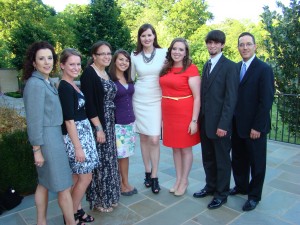Geena Davis says the media’s role in reshaping the image of women in society is simple: “If they see it, they can be it.”
The problem is that the media is not doing its part in representing women and men equally, Davis says, and when women are portrayed in television and film they, often are sexually provocative or stereotyped characters.
Davis, who has embarked on a mission to change that and offer more hope and empowerment for young women in popular culture, brought her message to a gathering at Lipscomb’s Andrews Institute.
That institute partnered with the Geena Davis Institute on Gender in Media Thursday for “A League of Their Own,” an event starring the acclaimed actor and also featuring Deborah Taylor Tate and female local media leaders to discuss the role of women and girls on screen.
Davis — who starred in movies like A League of Their Own, Beetlejuice, and Thelma & Louise — founded her institute in 2004 after watching children’s entertainment with her daughter and realizing the lack of female characters present in TV programming and family movies.
Davis’ institute, which focuses on research, education and advocacy, conducted the largest body of research on gender prevalence in the media and discovered that only 17 percent of characters in family films are women. Davis noted those few female characters often are portrayed in stereotypical or hyper-sexualized ways.
It’s not just popular media. Davis said women are not fairly represented in most areas of society, noting that the U.S. ranks 90th on the list of countries that have female representation in government.
“It’s astounding,” she said. “The fact is that women are seriously under-represented across every sector of society, but for the most part, we’re not truly aware of the extent of this.”
Davis said in her investigations, she’s learned most people don’t notice the lack of women in film or they believe gender disparity already has been corrected.
“This is why I think that research is so important because the facts dispel the myths and misconceptions,” she said.
“I really believe that facts are the most important tool to change minds.”
In family films, the Davis Institute found that for every single female character there are three male characters. Davis said the ratio of male to female characters in movies has not changed since 1946.
“Knowing all this,” Davis said, “we have to ask ourselves: what message are we sending to boys and girls at an incredibly vulnerable age?”
Davis said the lack of female representation and the ways women are portrayed in family movies is having a serious negative impact on children.
“We are communicating to children that women are less valuable to society than men and that women and girls don’t take up half the space in the world,” she said. “And the message is sinking in, because the more hours of television a girl watches, the fewer options she thinks she has in life. And the more hours a boy watches, the more sexist his views become. So, clearly there is a strong negative message about women being imprinted on kids.”
But according to Davis, it’s not hopeless.
“The good news is that media, being so powerful as it is, can have the same effect in a positive direction,” she said. “It can powerfully influence boys and girls to see girls differently. It can create opportunities to overcome social barriers.”
Davis said research shows that girls who see female characters portrayed in non-stereotypical ways will be more likely to see themselves as having more options in life.
Five of Lipscomb’s communication students were recognized at the event for their work on a short video called “Guess Who,” produced in cooperation with PBS and Davis’ institute. Kathryn McKinley, Marlee Vogel, Kyrsten Turner, Brynn Watkins and Michael Fox created the video and then shared their own reflections on the project in another short “Making Of” clip shown at the event.
The video features children from Lipscomb Academy and shows their ideas about careers for women, specifically their reaction to hearing that women can be pilots and race car drivers. The clip will be broadcast nationwide, beginning in the fall, to raise awareness about gender stereotypes among children as a part of a PBS campaign called Women and Girls Lead.
The students also were able to participate in a meet-and-greet with project donors Wednesday evening, prior to the main event with Davis on Thursday.
The students mingled with guests and showed their video on iPads, discussing their findings with those present at the reception.
The event included a luncheon and panel discussion with Tate, Davis, Beth Curley, president and CEO of NPT, Kate Herman, president and publisher of Nashville Business Journal, Debbie Turner, president and general manager of News Channel 5 Network, Deb McDermott, president of Young Broadcasting, Carol Hudler, president and publisher of The Tennessean and Doreen Wade, vice president and general manager of WSMV.
Tate, executive-in-residence for Lipscomb’s communication department and former FCC commissioner, co-chairs the Healthy MEdia Commission with Davis and moderated the discussion, which focused on the stories, accomplishments and challenges of the women who lead some of Nashville’s media corporations.
Following the panel discussion, Davis posed for a photo on Lipscomb’s Dugan Field with a group of local girls before introducing a screening of the film A League of Their Own in Shamblin Theatre.
Funds raised from tickets purchased for the event benefited the Geena Davis Institute and the Andrews Institute.

